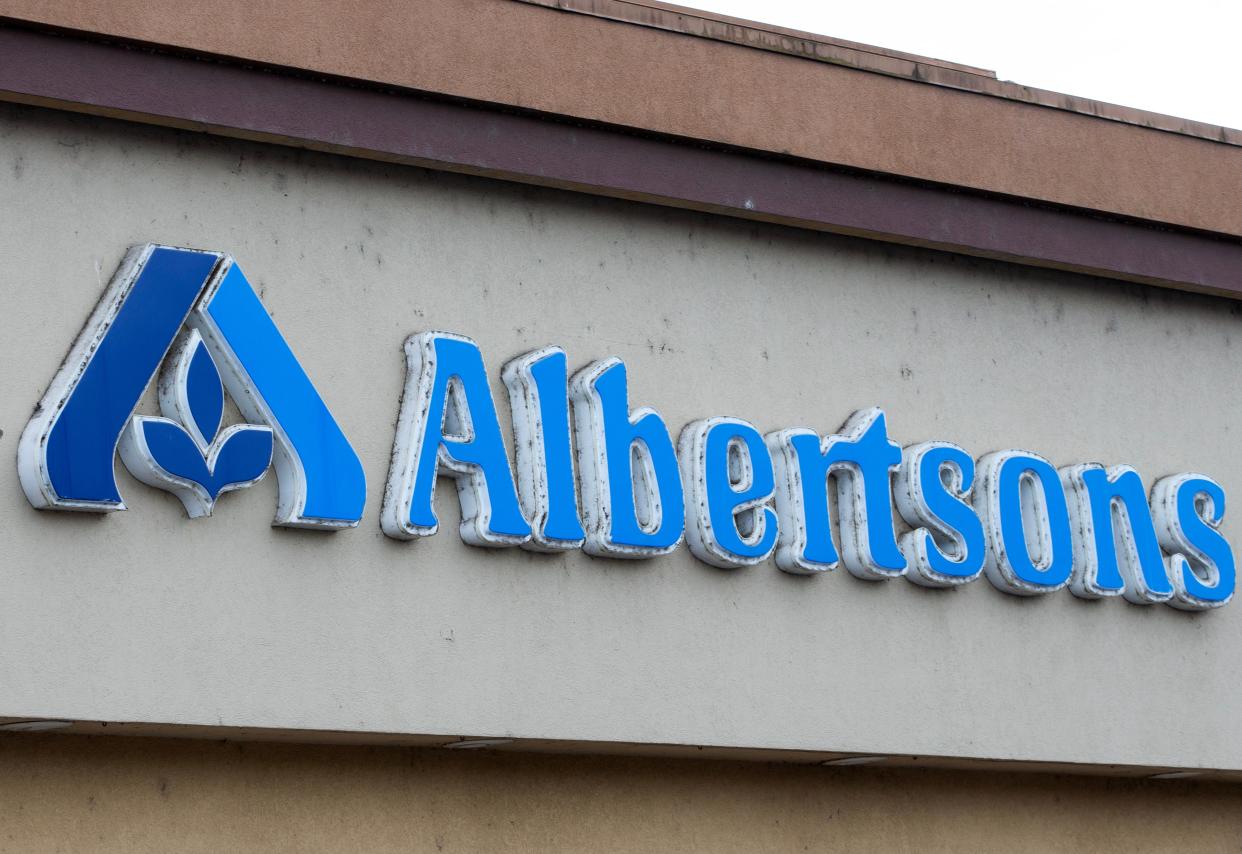Oregon, federal government sue to stop $24.6 billion Kroger Albertsons merger

- Oops!Something went wrong.Please try again later.
Oregon, eight other states and the Federal Trade Commission plan to file a lawsuit in federal court in Portland to block a $24.6 billion mega-merger between grocery giants Kroger and Albertsons.
The FTC alleges the proposed merger would violate the Clayton Act, a federal antitrust law.
The two grocery companies own 176 stores in Oregon under the Fred Meyer, QFC, Albertsons and Safeway brands.
Oregon Attorney General Ellen Rosenblum said Monday that the lawsuit will allege that the proposed merger will eliminate competition between the companies, leading to higher prices for consumers, lower quality of products and reduced competition for workers.
The FTC’s three-member commission voted 3-0 Monday to seek a temporary restraining order and preliminary injunction.
“If big grocery stores are allowed to reduce competition in this way, they can and they will charge higher prices for food for no good reason. And they will reduce services, including in their pharmacies,” Rosenblum said.
Kroger-Albertsons merger would create grocery behemoth
Kroger, the largest supermarket chain in the United States with 2,750 stores, announced in 2022 that it would acquire the second largest, Albertsons, which has over 2,200 stores.
If the merger were completed, the company would have over 5,000 stores and 4,000 pharmacies in 48 states. The companies said they would have more than 700,000 employees.
The estimated revenue between the two grocery store chains is more than $200 billion per year.
Kroger said the merger would result in lower prices for customers. It said it would invest $500 million to reduce prices and $1.3 billion to “enhance customer experience.”
The companies have said the merger would allow them to compete with online retailers like Walmart and Amazon.
Since the proposed merger was announced in 2022, however, concerns have been raised that it would eliminate competition.
Washington and Colorado previously sued to stop the merger in their state courts.
The other states included in the FTC lawsuit are Arizona, California, the District of Columbia, Illinois, Maryland, Nevada, New Mexico and Wyoming.
Kroger said in January that it anticipated the merger to be completed this year.
What is the impact on Oregonians?
A merger between the supermarket brands could impact nearly every community in Oregon.
Kroger purchased Fred Meyer in 1998. It operates 51 Fred Meyer and four QFC stores in the state.
Albertsons merged with Safeway in 2015. It operates 96 Safeway and 25 stores in Oregon.
The two companies previously announced they would sell 49 stores in Oregon as part of the merger to C&S Wholesale Grocers, though it hasn’t identified which ones. That was in an effort to appease federal regulators.
Rosenblum said Oregonians have seen the effects of grocery store consolidation before.
When Albertsons purchased Safeway, Washington-based Haggen purchased 146 of its stores for $1.4 billion.
Haggen sued Albertsons for $1 billion, claiming Albertsons sabotaged the transfer by giving it incomplete data and understocked stores.
Haggen filed for bankruptcy days later.
Albertsons later settled the case for $5.75 million.
Rosenblum said the Oregon Department of Justice has experience with mergers, and that may have been part of why the FTC is filing a lawsuit in Oregon.
“We’re very proud, actually, that the FTC chose to file here,” Rosenblum said.
Would layoffs result from a merger?
Kroger said it would not lay off “frontline” employees as part of the merger.
Rosenblum pointed to other mergers where similar promises have been made. That includes Microsoft’s acquisition of Activision. Microsoft laid off 1,900 workers in January, which has raised the ire of the FTC.
“Those promises tend to go out the door when the deal closes and hundreds of workers are laid off," Rosenblum said.
The United Food and Commercial Workers union has steadfastly opposed the Kroger Albertsons merger since it was announced in 2022, as have other unions.
In the last few weeks, however, the local chapter of the UFCW split from the national organization and announced support of the merger. That local chapter represents about 33,000 workers in Oregon, Washington, Idaho and Wyoming.
It said that the potential sale of stores to C&S was a best-case scenario as Albertsons parent Cerebus intends to sell the stores eventually.
“In a refreshing change of pace, C&S seems poised to deliver a much-needed fresh perspective for employees and customers alike,” UFCW Local 555 president Dan Clay said in a press release.
The lawsuit alleges that the merger would reduce competition between the grocery store brands for workers, making it harder for them to get higher wages, better benefits and improved working conditions.
“Despite the fact that we respect the local’s position, we believe it is out of step with both its own national organization and with this growing list of other labor organizations in Oregon that have stated their vocal opposition to the merger,” Rosenblum said.
“And besides that, we are confident in the voluminous evidence from a variety of sources showing the vital risks the merger represents to union grocery workers throughout the country, including here in Oregon.”
Bill Poehler covers Marion and Polk County for the Statesman Journal. Contact him at bpoehler@StatesmanJournal.com
This article originally appeared on Salem Statesman Journal: State, federal governments trying to end supermarket consolidation

